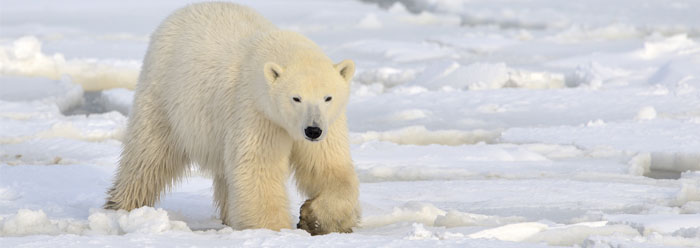 Global
Warming Halts, Arctic Ice Multiplies by Brian Thomas, M.S. *
Global
Warming Halts, Arctic Ice Multiplies by Brian Thomas, M.S. *
Fox News recently reported, "Arctic sea ice up 60 percent in 2013," publishing dramatic before and after satellite images of Earth's Arctic region.1 How could ice increase if man-made industrial emissions—which have not appreciably diminished of late—continue to heat the earth, melt glaciers, and kill polar bears? Scientists are producing conflicting predictions from the same available climate data—what pieces might their models be missing?
A technical comment published in Nature Climate Change shows that the actual warming trend from 1993 to 2012 was "significantly slower" than predictions from climate models.2 The authors also reported that Earth's global temperature warmed from 1998 to 2012 by 0.05°C up to 0.08°C. During this timespan, the overall trend actually stayed within the error margin, so there has been close to zero temperature change in the last decade and a half.
But climate reports—and predictions—vary widely.
The Intergovernmental Panel on Climate Change (IPCC) released their 2013 report, fingering man-made greenhouse gas emissions as the "very likely" causative agent in what, to them, has been a clear warming trend. Although they did acknowledge the apparent halt in global warming over the last 15 years, they predict that "Continued emissions of greenhouse gases will cause further warming."3
Conversely, the Nongovernmental International Panel on Climate Change (NIPCC) released a 2013 brief arguing that, since the warming trend essentially stopped in 1997 and greenhouse emissions like the "8% increase in atmospheric CO2" have not stopped, "no close correlation exists between temperature variation over the past 150 years and human related CO2 emissions."4
The NIPCC also contended that climate-change trends seem to be more closely linked with solar activity—primarily sunspot behavior—a finding that Institute for Creation Research (ICR) physicists have generally supported. However, "the next few decades may be marked by global cooling rather than warming," according to the NIPCC report, in which the secular scientists also suggested continued warming would probably not have a long-term impact since Earth was much warmer millions of years ago.4,5
In step with the IPCC's projections of continued warming, The New York Times wrote in 2012, "Some scientists think the Arctic Ocean could be largely free of summer ice as soon as 2020."6 But the August 2013 Arctic experienced record ice growth.
Whatever the reason for these incongruous predictions, one thing appears certain. In believing that global processes lie either at the whim of man-made chemicals or were subject to imagined eras from some distant past, both groups fail to consider that "The earth is the Lord's, and all its fullness, The world and those who dwell therein."7,8
How can so many intelligent scientists with access to the same data come to such different conclusions? Perhaps their climate prediction models rely more on what they wish to include rather than acknowledging that their best efforts are up against designs that transcend human understanding.
References
- Arctic sea ice up 60 percent in 2013. Fox News. Posted on foxnews.com September 9, 2013, accessed October 4, 2013.
- Fyfe, J. C. et al. 2013. Overestimate global warming over the past 20 years. Nature Climate Change. 3 (9): 767-769.
- Alexander, L. et al. Approved Summary for Policy Makers. In Climate Change 2013: The Physical Science Basis. Working Group 1 Contribution to the Fifth Assessment Report of the Intergovernmental Panel on Climate Change.
- Idso, C., R. M. Carter, and S. F. Singer, eds. 2013. Summary for Policy Makers. In Climate Change Reconsidered II: Physical Science. 2013 Report of the Nongovernmental International Panel on Climate Change (NIPCC). Chicago: The Heartland Institute.
- Vardiman, L. 2009. Will Solar Inactivity Lead to Global Cooling? Acts & Facts. 38 (7): 12.
- Gillis, J. Ending Its Summer Melt, Arctic Sea Ice Sets a New Low That Leads to Warnings. The New York Times. Posted on nytimes.com September 19, 2012, accessed October 9, 2013.
- Psalm 24:1
- Perhaps, ironically, Scripture predicts a global warming instigated, not by anthropogenic greenhouse emissions, but by rebellion. "Then the fourth angel poured out his bowl on the sun, and power was given to him to scorch men with fire. And men were scorched with great heat, and they blasphemed the name of God who has power over these plagues; and they did not repent and give Him glory." Revelation 16:8-9
* Mr. Thomas is Science Writer at the Institute for Creation Research.